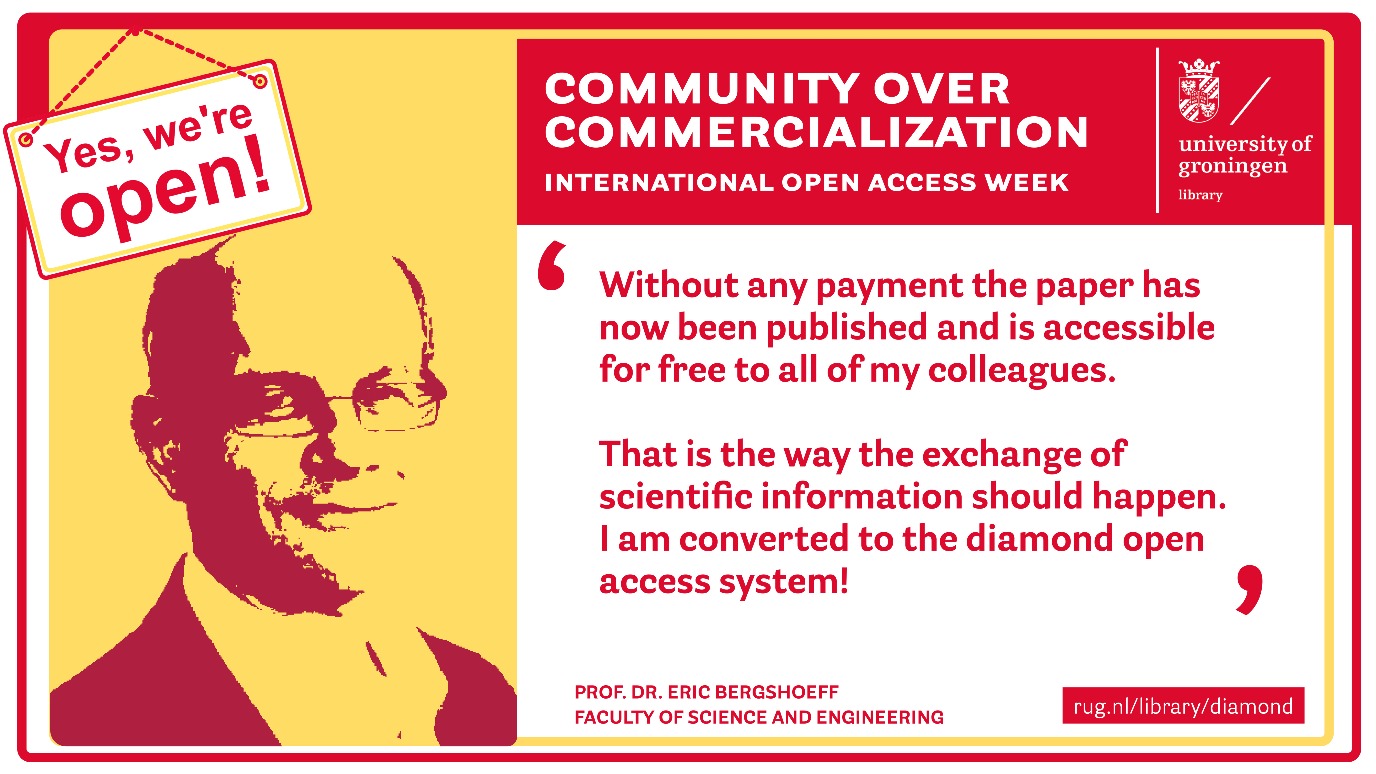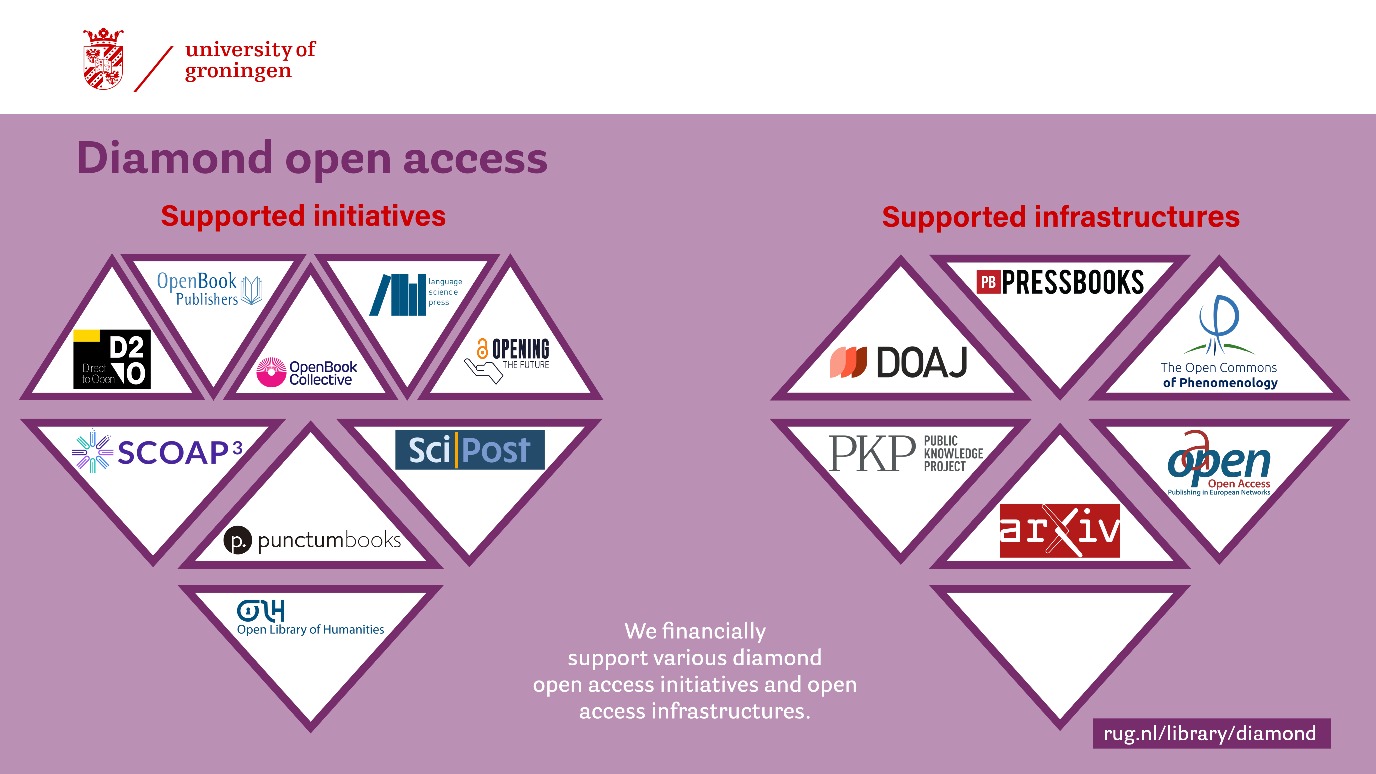Meet our experts on diamond open access

Want to learn more about diamond open access and how we at the library support it? Meet our experts Giulia Trentacosti and Margreet Nieborg.
“Diamond open access embodies the true and original spirit of the open access movement: to make the scholarly publishing industry more accessible, but also more affordable and fair for everyone.”
What is diamond open access?
Diamond open access is an open access model that does not charge publication fees. Basically diamond open access journals or publishing platforms are free to read for everyone (no subscription costs) and free to publish in (no Article Processing Fees, APCs). They are usually non-profit, community-driven and academic-led. The operating costs of diamond open access platforms are a fraction of those of commercial journals and are often covered by university libraries, academic institutions, research funders or government grants.

Diamond open access: more sustainable than pay-to-publish commercial alternatives
To give you an example, the Open Library of the Humanities (OLH) is a fully non-profit and scholar-led diamond open access publisher. It’s based at Birkbeck, University of London, and publishes 33 peer-reviewed journals in the humanities. Initially funded by grants, its operations are now supported by a consortium of almost 350 international libraries of which the University of Groningen Library is part. Each participating library pays a membership fee which is banded according to its size and is absolutely affordable. Our annual fee is in the range of €2,500, which is more or less the cost of one APC in a gold or hybrid open access journal, such as Frontiers (average APC €2,155). Keep in mind that €2,500 is a rather low APC level; journals like Nature and Science charge much more (e.g. the APC for Nature’s flagship journal is €9,750, while it is €4,272 for Science Advances). For the same amount we would pay for one open access article, we get to sponsor a sustainable publication platform that runs 33 journals (c.500 articles per year).
Another example is the Open Book Collective (OBC), which the UG recently became a supporting member of. The OBC is a charity organization that enables libraries and other knowledge institutions to evaluate, compare, and support a range of small-to-medium open access book publishers, as well as service and infrastructure providers. Via the OBC we support a variety of publishers (such as Open Book Publishers, Mattering Press, meson press, punctum books, mediastudies.press, African Minds, White Horse Press) and open publishing services providers (such as OAPEN Library, Directory of Open Access Books, and Thoth). This financing model allows book publishers to adopt a diamond open access model and move away from Book Processing Charges. The management and governance of the OBC is overseen by representatives of the different stakeholder groups (libraries, publishers and publishing services providers), which makes for a truly community-led and accountable organization.

New university presses
Also, in Europe we see in the slipstream of the open access movement the growth of so-called new university presses (Delft, Groningen, London, Nijmegen, Stockholm, etc.) that embrace diamond open access. A new university press is an academic publisher, typically affiliated with a university, that focuses on promoting open access to scholarly publications. These presses can play an important role in challenging the traditional publishing models. They often finance their publications through alternative means, such as funding from universities or governments.
Why is diamond publishing important for academia?
Diamond open access is essential because it proves that an alternative to the pay-to-publish commercial open access model is possible. It represents a more sustainable, affordable and equitable model which allows the scientific community to regain control of the publishing ecosystem. If scaled up and properly financed, diamond open access platforms could help the academic community diminish its dependence on traditional, for-profit publishers, as well as to drastically reduce the current cost of open access. Diamond open access embodies the true and original spirit of the open access movement: to make the scholarly publishing industry more accessible, but also more affordable and fair for everyone.
Unfortunately, investments in diamond open access platforms and open infrastructures are notoriously scarce in the Global North if compared to the multi-million payments universities hand out to commercial publishers – be that in the form of APCs or Read & Publish deals. In other parts of the world like Latin America, diamond open access has been the norm for decades.

How can UG researchers publish diamond open access?
We recommend authors to start by identifying suitable diamond open access journals in their field. The Directory of Open Access Journals (DOAJ) is a database of trustworthy open access journals. When searching the DOAJ, it’s possible to apply the filter ‘without fee’, which will show you only journals that don’t charge an APC. The DOAJ currently indexes 13,000+ diamond open access journals in all fields and languages.
If funded by the EU, I recommend considering Open Research Europe (ORE). ORE is fully sponsored by the EU and is intended as a free open access publication venue for EU-funded research. The platform supports the uptake of open science practices, such as early sharing and open peer-review.
Lastly, some publishers offer diamond open access models for academic books. For instance, Central European Press and Liverpool University Press (as part of Opening the Future), MIT Press (as part of Direct to Open), Punctum books, Mattering Press, mediastudies.press and Open Book Publishers.
Many diamond open access journals are hosted and published by university presses, by research institutions (e.g. Max Planck Society), or by learned societies. I recommend checking whether any of these options are available in your specific field.
University of Groningen Press
At the UG, University of Groningen Press (UGP) is an example of institutional publishing and diamond open access within the academic community. UGP collaborates closely with other Dutch and European university presses. This approach fosters a network of academic publishing entities, sharing expertise, resources, and best practices to promote open access and scholarly communication.
As attested by various UG authors, diamond open access journals provide high-quality peer-review and professional services.

In what way does the UB support community-driven publishing?
The University of Groningen has been committed to supporting sustainable, non-profit and scholar-led publishing initiatives for years, including the Open Library of the Humanities, SciPost, Punctum Books, Opening the Future, Open Book Publishers, etc.
University of Groningen Press prioritizes open access principles and operates in collaboration with the UB’s system, emphasizing the crucial role that libraries can play in facilitating open access publishing. It provides the infrastructure and the knowledge for UG staff to set up new journals and/or to transform existing journals to a fully electronic and open access platform. UGP also offers (text)book publishing. Books are typically available in open access formats, including PDFs, EPUBs, and multimedia versions; we offer print-on-demand if desired. UGP currently publishes 26 peer-reviewed journals, 22 of which are diamond open access. We only accept diamond open access journals without any delays or embargo. Furthermore, UGP has 95 OA book titles in our catalogue and 62 inaugural lectures. In 2022, UGP started publishing open textbooks. Going forward, we hope to be able to continue, and possibly expand, our support for open, non-commercial publishing platforms and infrastructures.
More information
Contact
-
(diamond) open access: openaccess rug.nl or openaccess umcg.nl
-
University of Groningen Press: ugp rug.nl
| Last modified: | 14 February 2025 4.45 p.m. |
More news
-
24 March 2025
UG 28th in World's Most International Universities 2025 rankings
The University of Groningen has been ranked 28th in the World's Most International Universities 2025 by Times Higher Education. With this, the UG leaves behind institutions such as MIT and Harvard. The 28th place marks an increase of five places: in...
-
05 March 2025
Women in Science
The UG celebrates International Women’s Day with a special photo series: Women in Science.
-
16 December 2024
Jouke de Vries: ‘The University will have to be flexible’
2024 was a festive year for the University of Groningen. In this podcast, Jouke de Vries, the chair of the Executive Board, looks back.

